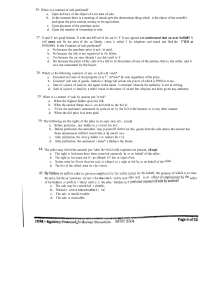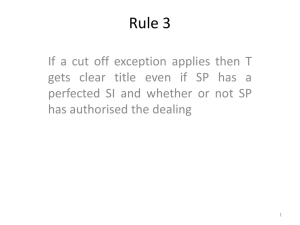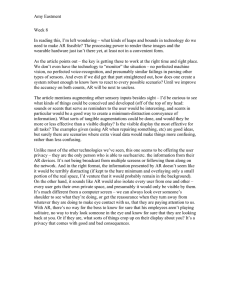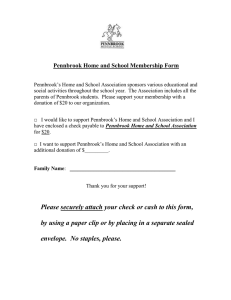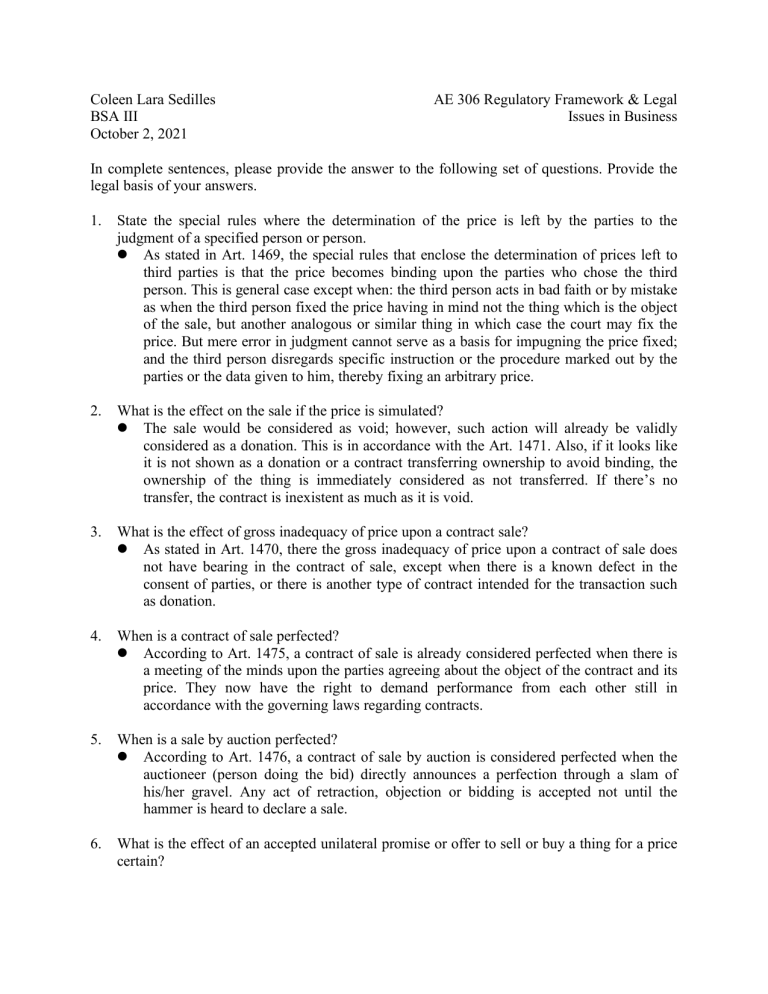
Coleen Lara Sedilles BSA III October 2, 2021 AE 306 Regulatory Framework & Legal Issues in Business In complete sentences, please provide the answer to the following set of questions. Provide the legal basis of your answers. 1. State the special rules where the determination of the price is left by the parties to the judgment of a specified person or person. As stated in Art. 1469, the special rules that enclose the determination of prices left to third parties is that the price becomes binding upon the parties who chose the third person. This is general case except when: the third person acts in bad faith or by mistake as when the third person fixed the price having in mind not the thing which is the object of the sale, but another analogous or similar thing in which case the court may fix the price. But mere error in judgment cannot serve as a basis for impugning the price fixed; and the third person disregards specific instruction or the procedure marked out by the parties or the data given to him, thereby fixing an arbitrary price. 2. What is the effect on the sale if the price is simulated? The sale would be considered as void; however, such action will already be validly considered as a donation. This is in accordance with the Art. 1471. Also, if it looks like it is not shown as a donation or a contract transferring ownership to avoid binding, the ownership of the thing is immediately considered as not transferred. If there’s no transfer, the contract is inexistent as much as it is void. 3. What is the effect of gross inadequacy of price upon a contract sale? As stated in Art. 1470, there the gross inadequacy of price upon a contract of sale does not have bearing in the contract of sale, except when there is a known defect in the consent of parties, or there is another type of contract intended for the transaction such as donation. 4. When is a contract of sale perfected? According to Art. 1475, a contract of sale is already considered perfected when there is a meeting of the minds upon the parties agreeing about the object of the contract and its price. They now have the right to demand performance from each other still in accordance with the governing laws regarding contracts. 5. When is a sale by auction perfected? According to Art. 1476, a contract of sale by auction is considered perfected when the auctioneer (person doing the bid) directly announces a perfection through a slam of his/her gravel. Any act of retraction, objection or bidding is accepted not until the hammer is heard to declare a sale. 6. What is the effect of an accepted unilateral promise or offer to sell or buy a thing for a price certain? . 7. 8. As stated in Art. 1479, the effect of an accepted unilateral promise is that both parties have the right to demand performance from each other. This is due to the fact that their agreement is binding upon the parties if there is already an object and a price determined in the agreement Give the rules with regard to any injury to or benefit from the thing sold after the contract is perfected but before delivery. Art. 1480 states that there are two rules and applies only if the thing is determinate. The first rule emphasizes that the seller will not be responsible for any fortuitous event without his fraud or negligence. The risk is already passed on to the buyer even if it is not yet delivered to him/her. The second rule emphasizes that the risk will not be put upon the seller until it the thing has been weighed, counted, or measured, and delivered. But the seller will assume the risk if there is a delay in transporting the goods sold to the buyer. State the rules governing the sale of goods by description and/or by sample. The rules governing the sale of goods by description or by sample are the following: the contract has the possibility of being rescinded if the volume of the goods delivered is not coherent to the description stated in the contract; the same revocation is done when the sample does not correspond with the description in the contract as well; lastly, all the more, the sale can be rescinded when both the description and the sample is not coherent with what is being stipulated in the contract.
